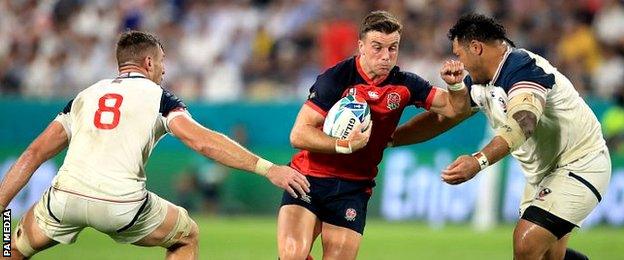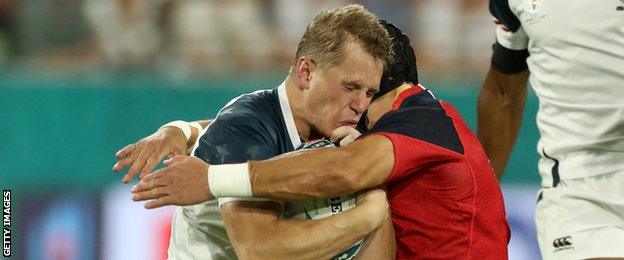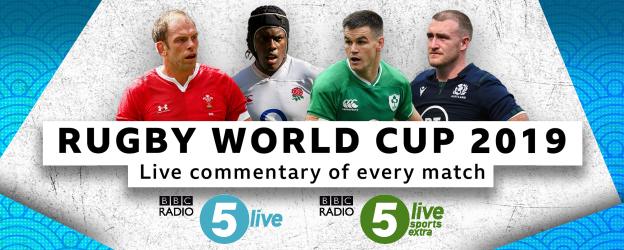Rugby World Cup: 'England's George Ford still to prove credentials'
- Published

2019 Rugby World Cup |
|---|
Hosts: Japan Dates: 20 September to 2 November |
Coverage: Full commentary on every game across BBC Radio 5 Live and Radio 5 Live Sports Extra, plus text updates on the BBC Sport website and app. |
The casual viewer tuning into the World Cup might have expected to see England throw it around against the United States, running tries in from everywhere.
It is not like that. It wasn't in my day and it certainly isn't now.
You have to be strategic. Every opposition team is playing on the biggest stage. They may be limited, but they are committed.
As Fiji found out against Uruguay, if you play loose and fast without doing your groundwork, they will undo you.
Instead, as the favourites, you have to be accurate and streetwise and perhaps after 60 minutes, with greater strength in depth off the bench, superior strength and fitness and space opening up for individual brilliance with ball in hand, you can stretch away.
England did that.
It was a very accurate, clinical performance in a 45-7 win, with minimal penalties and far fewer handling errors than they had against Tonga. They played confidently within a simple structure and their set-piece was fantastic, with solid, slick scrum, line-out and kick-off reception.
They played in really good areas, enjoying a landslide 78% of territory, and the USA ran out of steam. It reminded me of Saracens' way of doing things - they squeezed the life out of the opposition.
Model 10 Ford?

George Ford (centre) is a childhood friend of Owen Farrell, having grown up on the same street
Fly-half George Ford won the man of the match award. He is a very talented footballer, there is no doubt about that. He reads the game superbly, puts people into space with the timing of his passes and is an under-rated runner in broken field.
His relationship and understanding with Owen Farrell - with whom he has played since the pair were teenagers - and Leicester team-mate Manu Tuilagi are an added bonus.
But this is the sort of game that we have seen him boss before.
Part of me really wants the England backline to be Ford at fly-half, Farrell at inside centre and Tuilagi at outside centre, but until I see Ford seize control of a game that is going against England, rather than direct traffic in one that they will probably win anyway, it is difficult to justify that selection for the biggest matches.
We all know what he can do, but there are things that he hasn't done in tight encounters.
His last extended run at fly-half came to an end in the summer of 2018 after back-to-back defeats in South Africa and Six Nations losses to Scotland and France.
At the real top level, when his decision-making is under pressure because of a retreating pack or a big scoreboard deficit, can he make the right calls or come up with the clutch play?
I am yet to see that.
I hope this is the tournament when he does prove it. I hope that - if coach Eddie Jones goes with them - Ford, Farrell and Tuilagi can carry momentum into the game against Argentina and then France and the quarter-finals and prove to be a world-class triumvirate.
England's World Cup | |
|---|---|
22 September | |
26 September | |
5 October | Argentina (09:00 BST) |
12 October | France (09:15) |
I am quite torn in terms of selection for the Argentina game on 5 October.
I think Henry Slade at outside centre with Farrell and Tuilagi inside him - the combination that England deployed through this year's Six Nations - would have been Plan A had Slade been fit.
But there is still clearly an issue around Slade's knee. He came on for half an hour against Tonga, which was his first Test appearance in more than six months, and needed treatment during that cameo.
Jonathan Joseph has impressed so far. He made more clean breaks (four) than anyone against the US and was joint top of the same statistic (with three) against Tonga, despite only coming on for the last 13 minutes.
He is a really classy operator with ball in hand and comes with 44 caps of experience as well. He really makes defences think and carries a different type of threat to Tuilagi.
Farrell, Tuilagi and Joseph at 10, 12 and 13 respectively will be in Jones' thinking, but the sensible option, considering continuity as well, is Ford-Farrell-Tuilagi.
Francis to face the music

Piers Francis' tackle on Will Hooley came direct off the first kick-off
Piers Francis is the midfield option that probably will not be available to Jones.
US flanker John Quill took most of the disciplinary heat when he was deservedly shown the tournament's first red card for a shoulder hit to Farrell's head.
It shows how much the culture of the game has changed. In my playing days, I saw plenty of occasions on which a player would throw in a cheap-shot shoulder, and I have been on the receiving end of a few too.
Previously, there might have been a bit of handbags and that would have been that, but the modern player has to be accountable.
Quill's was a cut-and-dried red card considering the modern guidance to referees and the scrutiny on the officials after World Rugby's statement criticising the standard of refereeing at the tournament.
Francis' tackle on US full-back Will Hooley in the opening seconds of the match was not that much different to Quill's on Farrell or Australia wing Reece Hodge's attempt on Peceli Yato that earned him a three-match ban.
Quill's was more clearly a shoulder charge rather than a tackle, but Hooley was standing still as Francis chased up to make his tackle.
Hooley didn't drop his body height into contact, Francis didn't seem to make any effort to go lower and he didn't seem to have his view of the tackle blocked.
That leaves few mitigating factors in Francis' favour in World Rugby's very clear guidelines., external
After being cited on Friday morning, he will be fortunate to get away with anything less than a three-match ban.
Matt Dawson was speaking to BBC Sport's Mike Henson.
